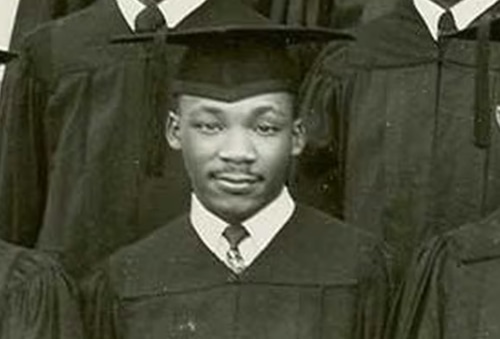A project to restore a historic New Jersey home associated with Martin Luther King Jr. and turn it into a museum and community center is officially underway.
Local researchers say the famous civil rights activist stayed in the dilapidated, fire-damaged terraced house in Camden in 1949 and planned his first sit-in.
After years of efforts to preserve the house, activists leading the project finally broke ground on Saturday, marking the start of the restoration.
“We want this house to become a museum where people can go in and see where Dr. King prepared his messages and his first sit-in for civil rights,” said Amir Khan, head of the nonprofit group that owns the building and worked to preserve it.
The house on Walnut Street was where King lived on weekends and summers from 1949 to 1951 while attending the now-closed Crozer Theological Seminary in Chester, Pennsylvania. He graduated from Morehouse College in Atlanta at the age of 19 before beginning his theological studies.

Martin Luther King Jr. graduated from Morehouse College in Atlanta in 1948 at the age of 19, a few months before moving north to study at Crozer Theological Seminary in Chester, Pennsylvania (Photo courtesy of Morehouse College ).Morehouse College
According to local researchers, King had a bedroom on the second floor of the house and lived with his classmate Walter McCall, whose uncle owned the house.
The building was abandoned and fell into disrepair for years. A nighttime fire last year nearly destroyed it, causing the roof of the abandoned building to collapse.
Jeanette Lilly Hunt, who was a young woman when King and McCall lived in the house then owned by her father-in-law, had paid property taxes on it in the hopes that someone would preserve it.
In 2021, she turned it over to Khan, a local pastor and activist with a vision for the site.
Khan's planned museum would show King's time in Camden and display a green and gold chair, now covered in plastic, that came from the house. According to Hunt, King liked to sit in it while he worked.
On the adjacent property, the nonprofit plans to convert the 10,000-square-foot space into the Martin Luther King Center for Social Justice, a facility to support community initiatives and provide more information about the city's civil rights movement.
In 2021, Camden was awarded $99,789 New Jersey Historic Trust Grantto research locations of the civil rights movement in the city. The Walnut Street building is listed as one of those sites, which could help it receive funding for renovations, officials said.
Construction is expected to begin in January, Khan said.
Dancers from the Unity Community Center perform an African dance during a groundbreaking ceremony for the MLK Museum in Camden on Saturday, December 7, 2024.Joe Warner | For NJ Advance Media
There are also plans to show a video reenactment at the museum illustrating a discrimination incident that occurred in Maple Shade when King lived in the home.
According to historical records uncovered in 2015 by Haddon Heights resident Patrick Duff, King, his roommate McCall and two friends planned to visit the now-closed Mary's Café in Maple Shade in 1950.
Jesthroe Hunt, Jeanette Hunt's late husband, who remembered that day, warned her that black guests might not be welcome.
King reportedly responded, “'Do you think we shouldn't go there?' “We need to change this so we can go anywhere,” Jesthroe said in a 1998 Burlington County Times article.
At the cafe, the group demanded beer and glasses from owner Ernest Nichols, who refused, saying he could no longer sell packaged goods after 10 p.m. on Sundays. When King then asked for ginger ale, Nichols again refused service.
The group remained seated, prompting Nichols to threaten them, fire a handgun in the air and say, “I killed for less,” police reports said at the time.
King was 21 years old and recalled the incident years later when asked what motivated him to become the civil rights activist he was, Khan said.
On Saturday, dozens of people attended the laying of the cornerstone next to the boarded-up house. There was a large sign in front of the site that read “The Future Home of the MLK Museum.”
A lively African dance and drumming performance by children from the Unity Community Center in Camden opened the ceremony.
Officials also presented a plaque honoring Philadelphia native Clarence Jones, MLK's attorney and speechwriter. Jones, now 93, played a key role in smuggling King's “Letter from Birmingham Jail” and helping raise money for the civil rights leader's bail. Once completed, its plaque will be displayed in the center.
Only 2% of the 95,000 sites on the National Register of Historic Places deemed “worthy of preservation” by the federal government focus on the experiences of Black Americans. “That’s why it’s important to preserve a house like this,” Stephanie Harris, director of Seton Hall University’s Africana Studies program, said at the groundbreaking ceremony.
“The home’s true value lies in its connection to King and its potential to teach us about this city’s important role in the history of civil rights,” Harris said.
Our journalism needs your support. Please subscribe today NJ.com.